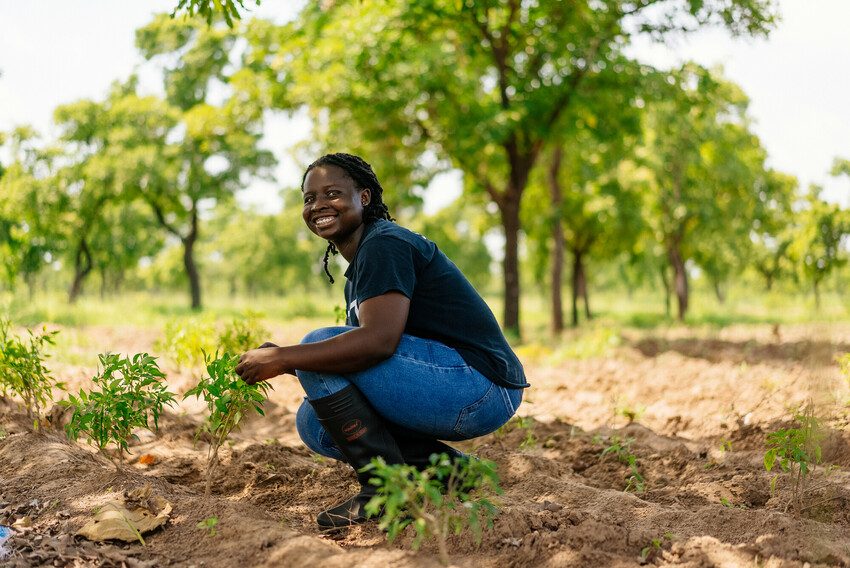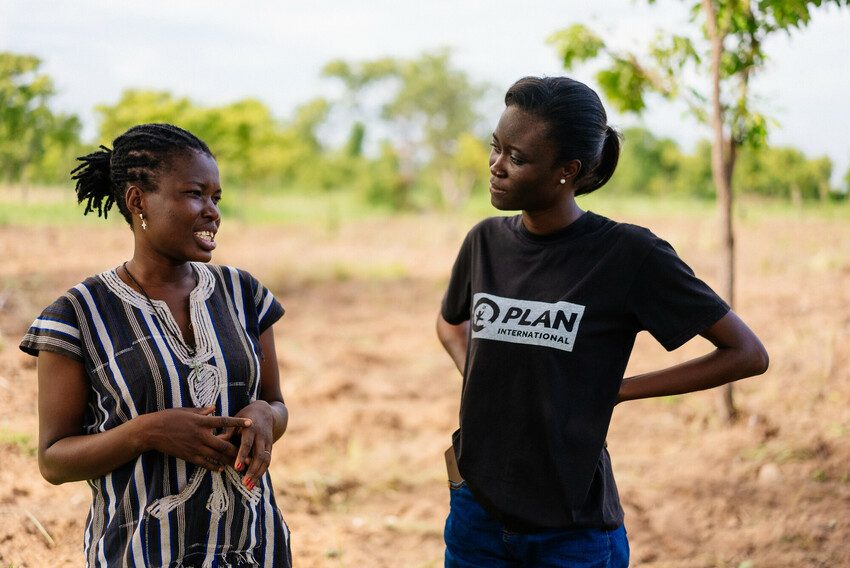Young women farming their way to a more sustainable future
Learning green skills to help adapt to the effects of climate change
24 October 2022A new generation of entrepreneurial female farmers is using green skills to shake up farming, producing food and creating sustainable livelihoods for their communities.
Crouched in a row of furrows, where pepper seedlings peak hesitantly from the earth, smallholder farmer Olivia Kipo, 24, is cutting weeds with a cutlass.

“When I think about how small a seed is,” she remarks, “how it’s put into the soil, how it germinates then turns out to be food for so many people, helping to reduce malnutrition and saving people from hunger – it amazes me.”
Here in the rural north of Ghana, hunger is a burgeoning problem. The effects of climate change are palpable – lack of rainfall, flooding, unpredictable seasons and rain patterns. Traditional agricultural practices are fast proving insufficient to protect crops from their impacts.
Now a new generation of entrepreneurial female farmers is using green-fingers and green skills to shake up farming, producing food and creating sustainable livelihoods for their local communities.
“Climate change is severely dealing with us,” says Olivia, who as a small child, when rain patterns were as sure and steady as the rise and fall of the sun, watched her parents farm this land. “You can’t even predict the rain pattern, and currently it’s not raining. Right now, we’re supposed to have finished transplanting, but because we don’t have rain, we’re not able to do that.”
Malnutrition in communities
As a teenager, Olivia noticed that despite the prevalence of agriculture, malnutrition levels in her community were high. People were prone to eating one particular meal all the time, she explains. “It was usually made from maize, without variety, and it led to high levels of malnutrition.”
At high school, Olivia studied food and nutrition, learning the nutritional benefits of vegetables, and went on to study biochemistry at her local university. Then, she attended a green skills course run by Plan International, a course which, she says, consolidated her interest in environmentally friendly farming techniques.
On the course, Olivia learned mulching, compost making, and how to use fertilisers and environmentally friendly chemicals, as well as marketing, branding and general business skills.
Now she sells her cucumbers, tomatoes, peppers, cabbages and chilli peppers not only to local people, but to restaurants in local towns and the capital, Accra.
“The training from Plan International changed my perspective about the whole thing,” says Olivia. “As a farmer, I realised I could brand my products and that would help me reach out to more customers. They provided me with a tricycle so I could reach the farm, and safely transport my products to my customers, and a fence to prevent animals invading my crops.”
“Plan International’s Green Skills programme was designed to address youth unemployment,” explains Abigail Mamle Teye, Plan International Ghana’s Youth Engagement Facilitator, who leads the programme and acts as a mentor to the young farmers.
“Our Green Skills course equipped participants with the skills to overcome the challenges of unpredictable weather patterns.”
Abigail Mamle Teye, Plan International Ghana’s Youth Engagement Facilitator
“It had a special focus on farming in a way that protects the environment,” says Teye, “so, the projects equipped young people, especially women, with employable skills and alternative, unique methods in farming that are environmentally-friendly.”
The most amazing thing is having Abigail in her corner, says Olivia. “She’s there for me 24-7, ready to give me advice when business gets tough.”
Sustainable crops
Nearby, Christiana Sunbabaara, 27, runs a pumpkin farm, producing not just pumpkin seeds but pumpkin oils, drinks and powder.

“Pumpkin is really an interesting plant,” says Christiana. “It grows easily, and you can farm pumpkin anywhere. It’s the least exploited vegetable found in this region, yet it contains a lot of health benefits, so I felt that farming pumpkin would help me to solve health problems within the society.”
Christiana, who grew up helping her father on his farm, benefited from Plan International’s green skills training at a time when her farm was failing, and thanks to Plan’s support has now been able to buy equipment such as a pumpkin blender and seed oil extractor. “I was almost collapsing when Plan came in. They gave me much-needed support.”
Now Christiana supplies local communities with food and employs local women on her farm. She also intends to train others to set up businesses of their own.
“The cracking of the pumpkin, planting of the pumpkin… Almost everything about the pumpkin work is female-related, so I do have intentions of training more people, so they will come out and set up their own businesses.”
A burgeoning crisis
Like most other countries in West Africa – and the rest of the world – Ghana is grappling with the punishing effects of the Covid-19 pandemic, economic pressures such as rising inflation, and soaring food, fuel and fertilizer prices, all compounded by the war in Ukraine.
The effects of climate change in northern Ghana include lack of rainfall and erratic seasons
Humanitarian agencies have warned that food shortages and hunger will be seen in Ghana in 2023 unless warnings are heeded. Meanwhile, it’s a case of adapt or die for smallholder farmers – particularly in the northern region, which only ever benefited from one rainy season. And these rains, says Teye, are increasingly unpredictable.
“It has become a great challenge to farm the land. In the past, farmers could predict rainfall patterns and the weather, and use that to plan when to sow, when they expected the rains, and when to weed and harvest.”
“Our Green Skills course equipped participants with the skills to overcome the challenges of unpredictable weather patterns,” Teye adds, “and farm all year round, by adjusting to the weather changes, and planting crops to get maximum yield.”
As young people face up to an ever more uncertain future, blighted by the ravages of climate change, Teye believes it will be crucial to provide green skills education. Without it, she warns, how can we support young people in the face of the immense climate challenges and economic shifts they already confront, and the ones yet to come?
For Christiana, her now thriving farm already represents a lifeline. “Farming brings food. Once you’re able to produce and feed several other people within the community, you feel so fulfilled in life.”


